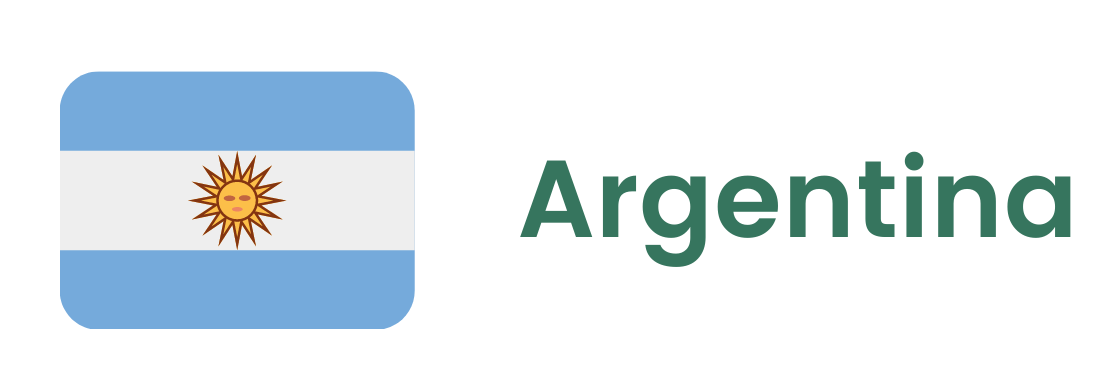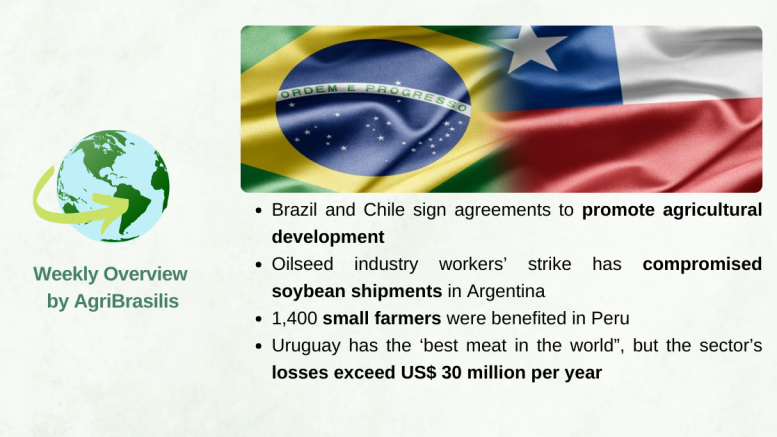Brazil and Chile Sign Agreements to Promote Agricultural Development

Retenciones (export taxes) on meat and dairy products have been adjusted. The measure applies to exports of all cuts in the “beef” category (whether A, B, C, D or E) and pork, in addition to eliminating export duties on dairy products and reducing by 25% the retenciones on all animal proteins (beef, poultry, lamb, etc.) that are exported, and which are currently taxed between 4.5% and 9%. Thus, it is estimated that around US$ 130 million will be returned to the chain. “Based on these new measures, this amount will return to the production chain and make it more competitive,” indicated the Ministry of Agriculture. (Secretariat of Agriculture; Government of Argentina)
Oilseed industry workers’ strike has compromised soybean shipments in the country. The strike was initiated by two unions, demanding better wages due to inflation. (Capym)

The Secretariat of Agricultural Defense published Ordinance No. 1161, revoking Ordinance No. 1,158, which reduces the “scope of the zoosanitary emergency area” in the State of Rio Grande do Sul and declares “zoosanitary emergency for the municipalities of Anta Gorda, Doutor Ricardo, Putinga, Ilopolis and Relvado in the State of Rio Grande do Sul, due to the detection of infection by the pathogenic virus of Newcastle disease in commercial birds”. (MAPA)
Brazil and Chile sign agreements to promote agricultural development. Nineteen agreements were signed, three of which are focused on agriculture. Brazil currently exports US$ 1.5 billion to Chile per year and imports US$ 1.4 billion. (MAPA)
Launched the PSA Carbon Agro Perene, a methodology that measures ecosystem services and forest carbon in productive and conserved areas within Brazilian rural properties and provides payment for environmental services (PSA) and carbon credits. Farmers are remunerated based on the environmental services they provide, assessed by ecological indicators and good agricultural practices, taking into account forest conservation, water quality, maintenance of habitats for biodiversity, etc. Measurement is in units of C+ (Carbon Plus), which corresponds to the removal of one ton of CO2 from the atmosphere. (Citrosuco; ECCON Soluções Ambientais; Reservas Votorantim)
Researchers point to Moringa oleifera as a potential species for feeding ruminants during dry periods. The species is drought-resistant and has high levels of proteins, vitamins and minerals, which can improve yield and quality of animal products with less environmental impact and cost reduction. “When harvested at a height of 1.6 m and chopped in its entirety (stem and leaf), the plant presented a total crude protein content of around 14% and dry matter digestibility of 64.3% during the dry period, similar to several tropical grasses during the rainy season. This suggests that there will be excellent animal consumption and performance. However, it is necessary to manage the replacement of soil nutrients, especially phosphorus and potassium”, said Fábio Prudêncio de Campos, researcher at IZ-APTA. (IZ-APTA; SAA; MAPA)
BP Bunge Bioenergia will invest US$ 95.1 million to expand sugarcane milling at its plant in the State of Tocantins, which will produce 3.4 million tonnes per harvest. Construction will begin in October and is scheduled for completion in July of 2026. (BP Bunge)
Launched a project to strengthen rural settlements and promote the sustainability of family farming in the State of Mato Grosso. The initiative will encourage more than 4,300 farmers and aims to provide training and technical assistance, strengthen the production chain, encourage female participation and mechanize agricultural production. (MAPA; UFMT)


The country has granted authorization to import Brazilian avocados, the third market opening to Brazil in 2024. In the 1H/2024, exports to Costa Rica totaled around US$ 153 million. (MAPA)
![]()
1,400 small farmers were benefited from the delivery of 73 forage harvesters and 67 brushcutters in the Puno region. The action is part of the Agro Rural Program, which has already benefited 45 districts and aims to improve the animal production of small farmers in the face of bad weather. “We are committed to providing the necessary support to our farmers so that they can adequately conserve and supply forage and supplementary feed for high-quality Andean livestock. These forage conservation kits are a fundamental tool to achieve this,” said Víctor Baca Ramos, executive director of the program. (Midagri)
![]()
The country has the ‘best meat in the world”, said Natalia Barsanti, Quality Manager at the National Meat Institute, but the sector’s losses exceed US$ 30 million per year. Beef represents US$ 29 million of the losses, due to handling, abscesses and bruises in the animals, and US$ 1.2 million are for sheep meat, due to the heterogeneity of the carcasses. (INAC; INIA)

READ MORE:

